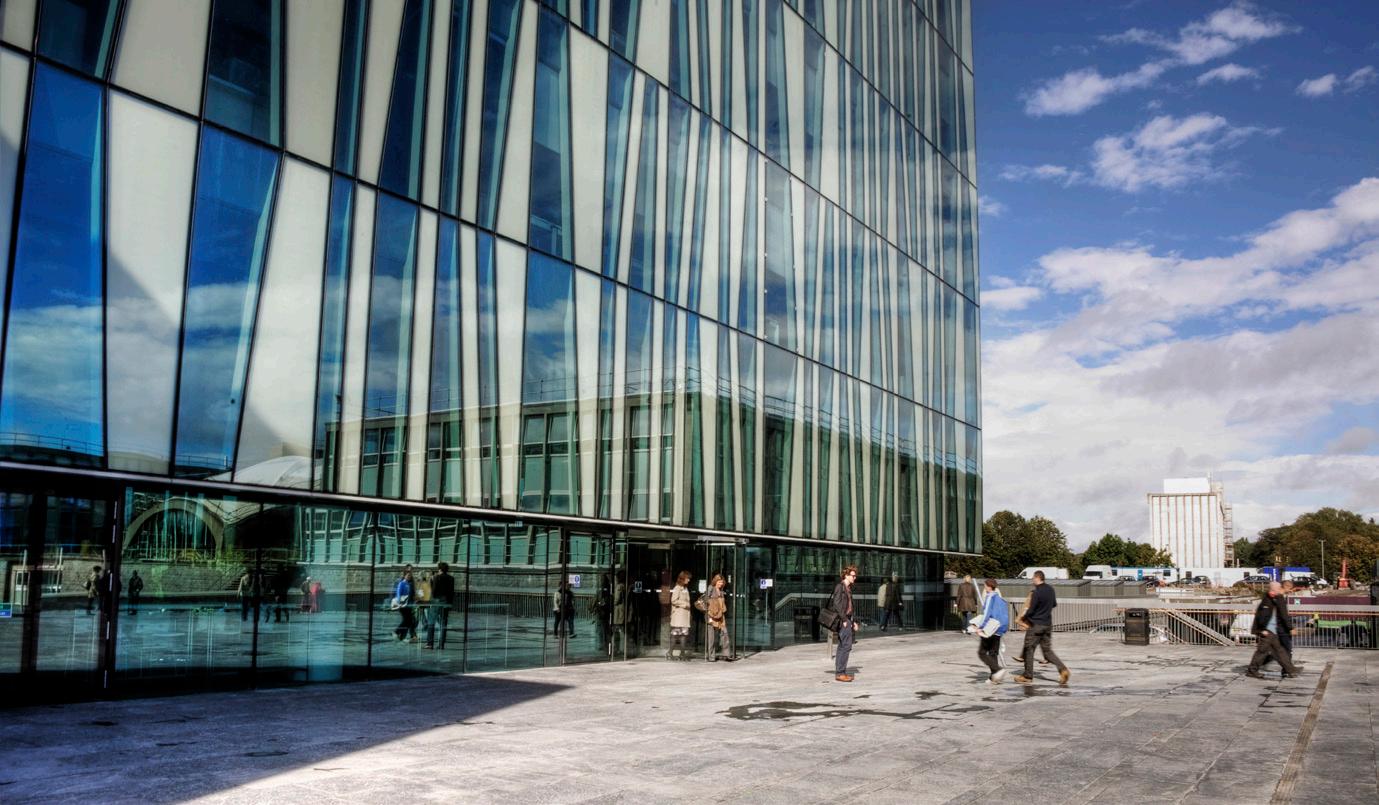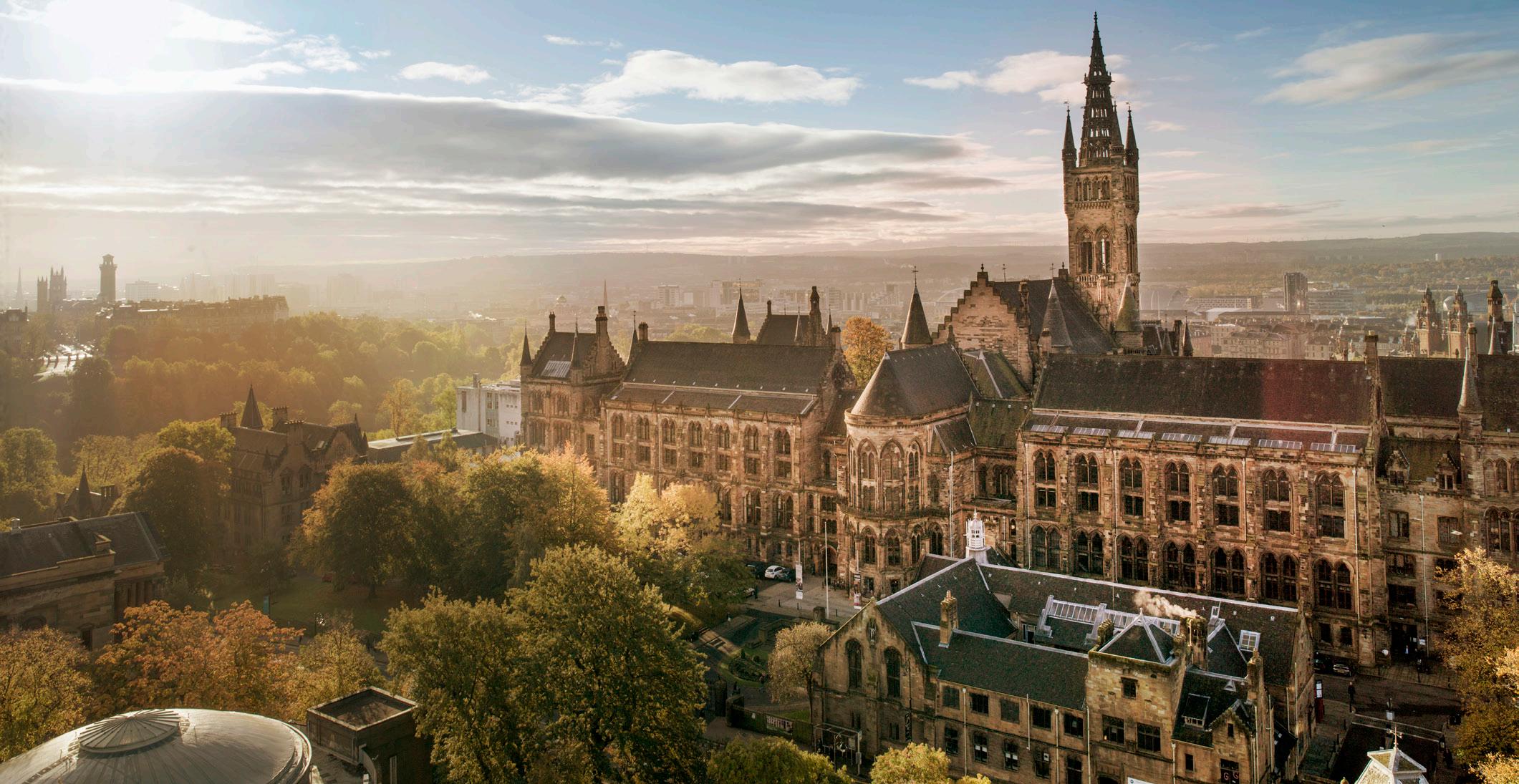
19 minute read
THE JOURNEY TO NET ZERO
In 2019, the UK became the first major economy in the world to pass laws to end its contribution to global warming by 2050. The target requires the UK to bring all greenhouse gas emissions to net zero by 2050, compared with the previous target of at least 80% reduction from 1990 levels. Scotland has set its own target and seeks to reach Net Zero five years ahead of the rest of the UK, by 2045. However, many organisations driven by the latest rise of the climate change topic and their consumers are going further and setting even more ambitious targets. We have asked three energy management professionals to share their organisations’ journey to Net Zero.
Kirsty Rice, Environmental Lead Manager at JTI UK
Advertisement

JTI UK has over 500 employees across our head office, distribution centre and field-based sales force. We are a tobacco company with a difference, sustainability is absolutely fundamental to our decision-making. As part of a global company, that has operations in over 70 countries, we take responsibility for understanding and improving our environmental impacts. Our wider Sustainability Strategy also covers our respect for human rights, an improved social and environmental impact and our good governance and business standards.
In the UK, we launched our Environmental Plan in 2020, setting out our commitment to tackle our emissions, energy, waste, water and to build stakeholder engagement across our suppliers, customers and employees. You can see our plan at https://www.jti.com/europe/unitedkingdom/our-uk-environmentalplan.
Although the plan is new, we already have made good progress, including an agreement to move all of our company cars over to plug-in hybrids as the interim step towards full electric. On the basis of a successful trial, we also introduced the requirement for all new tenders for goods and services to include ESG (environmental, social and governance) criteria in the supplier evaluation. To oversee the delivery of the plan and targets, we created a new Environmental Taskforce to embed ownership and report progress to our senior management board.
Net Zero Targets
JTI UK has committed to become Net Zero by 2030. We will reduce our operational emissions by 80% through swapping our company car fleet to electric vehicles and switching to renewable energy sources. We will also address our key value chain (Scope 3) impacts to mitigate and reduce associated emissions – we will set a reduction target for these in 2022.
Not forgetting good practice energy management, we have complimentary energy targets to reduce our use by 20% and build on-site generation where possible. We have specifically aimed for Net Zero rather than Carbon Neutral as we feel this is better aligned with our global ambitions and the science-based targets initiative. For any unavoidable emissions, we will invest in off-setting schemes appropriate for Net Zero.
JTI UK Environmental Plan 2030
DO LOADS MORE WITH TONNES LESS
Emissions
Objective
Reduce our impact on climate change
Targets
• Achieve Net Zero emissions by 2030 • Set a target for our distribution and travel emissions (Scope 3) by 2022 • Reduce emissions from our own operations (Scopes 1 & 2) by 80% by 2030 • Ensure fleet transition to
EV by 2030 Energy Waste
Objective
Reduce and decarbonise our energy use
Targets
• Source 100% renewable electricity from 2020 onwards • Source 100% renewable energy by 2025 • Reduce energy consumption by 20% by 2030 • Invest in our own renewable energy projects
Objective
Contribute to the transition to a more circular economy
Targets
• Divert 100% of all on-site waste from landfill by 2023 • Ensure our suppliers send zero waste to landfill by 2025 • Reduce general waste by 20% by 2030 • Increase our recycling rates of general waste to 75% by 2030 • Work with our direct suppliers to source more sustainable, recyclable and reused materials Water
Objective
Reduce water usage at our sites
Targets
• Invest in water efficiency measures Engagement
Objective
Embed responsible behaviour
Targets
• Reduce impact from our supplier sourcing
• Agree environmental policies for marketing activities and events from 2020 • ESG criteria included within all tenders from 2021
• Encourage our consumers to act responsibly
• Raise awareness on the appropriate disposal of our products • Support sustainable packaging trials
• Put all of our employees at the heart of our ambition
• Appoint and operate an environmental taskforce • Develop engagement, volunteering and reward programmes
Challenges and Opportunities
As with any environmental programme, it takes time to embed and create the level of engagement needed to prioritise action. We are all individuals with day jobs and sustainability/environment is still often seen as add-on. However, at JTI UK, we have been engaging with senior management and across the company since 2018 on broader sustainability, with climate change and environment featuring high on the agenda. Their support in creating a Sustainability Team, with two new dedicated posts, has helped to communicate the importance of this area to the rest of the business.
Our approach is to have clear priorities and to focus on those areas of the business which have a significant impact, like procurement or office operations, for example. We get involved with them on a more one-to-one basis, with regular meetings, running inductions and workshops, tailoring and developing actions lists, for instance. We are also happy to work with those teams who are actively engaged but may have a smaller impact - we can play a more advisory role with them. Understanding who and where we need to support helps us work with different directorates and functions, bringing them along on the journey.
The other thing to consider is that this can be a complex area, especially considering the value chain and the number of decisions feeding into this – covering everything from the goods and services we procure, the raw materials we use and the downstream end-of-life disposal. We will not always get everything exactly right and will need to learn from mistakes along the way, but we will continue with our end goal of 2030 in mind. This is why we have included an engagement pillar within our environmental plan, because we recognise that we cannot do this alone, we need everyone to come along on the journey with us.
Much of what we need is in hand. We have good support from the board, we are engaged with our key teams and we have supporting budget in place. Externally, the creation of smarter grids and electric vehicle infrastructure will support the move to Net Zero. The banning of new combustion vehicle engines from 2030 will help move this very quickly, but government and industry need to lead by example from a broader perspective. Tackling product haulage and distribution is part of our net zero ambition, but this is more challenging, and the pace will be set by our supplier unless the technology moves quicker.
Jargon is a common issue. There seems to be a lack of scrutiny around net zero and the interchangeability between this
and carbon neutral. In addition, I am seeing so many claims of sustainability of, for example, packaging and materials. We are a team with a finite resource, and we spend valuable time fire-fighting these claims and educating our colleagues about some of the pitfalls. The government, energy industry and environmental professionals need to get better at communicating and being consistent with terminology so that we are all better informed.

Final thoughts
In addition to assessing our Scope 3 emissions this year, we will be focusing on some key projects which will help support our environmental ambition. This includes a “green” refurbishment of our distribution centre, seeking the approval of a sustainable events policy and the further development of our waste management plans. It is an exciting time for us and, although the past year has been rather extra-ordinary it has not stopped us pushing forward.
Author’s profile:
Kirsty is an environmental professional with experience of developing strategic direction, delivering practical solutions and providing day-to-day advice. Her role at JTI UK as Environmental Lead includes the development and delivery of the Environmental Plan, embedding environmental sustainability within the business and ensuring compliance with environmental legislation. She is a qualified Low Carbon Assessor, ESOS Lead Assessor, PRINCE2 Project Manager and Full Member of EMA.
Jane Boyle, Energy Manager at University of Aberdeen

Founded in 1495, the University of Aberdeen is Scotland’s third oldest university and the fifth oldest in the UK. The University has three campuses in Aberdeen, one in Qatar and employs more than 3,500 staff. Last year, the University marked its 525th anniversary by celebrating its rich and diverse achievements of the past with the launch of a new strategic vision, Aberdeen 2040. As part of the overarching Aberdeen 2040 Strategy, the University committed to reach Net Zero Carbon before 2040.
The recently developed Net Zero Carbon Strategy replaces the historical Carbon Management Plan which was first developed in 2009 and focussed on energy emissions. The Carbon Management Plan recorded carbon savings in excess of 25% over a 10-year period.
The Energy Team, who sit within the Directorate of Estates and Facilities at the University, are responsible for the planning, execution, and delivery of the Net Zero Carbon Strategy. The team also oversees all utilities, renewable energy systems, district heating networks, carbon accounting, building management systems, energy metering systems and awareness-raising in relation to energy and sustainability initiatives on campus.
Net Zero Targets
We are aware that students believe climate change is the single most important issue facing the world at present and we want to show that we are committed to taking responsibility for our fair share of carbon emissions.
Achieving net zero will enhance our brand as an environmental champion institution and assist us in attracting the best staff and students to the University. We want
to ensure that we adhere to the triple bottom line concept through running the campus and business in the most effective manner and minimising our environmental impact on the planet. To achieve our goal in the most efficient manner we have mapped out the process and required steps. Our boundary includes our 4 campuses and all our outlying buildings.
Carbon emissions are already reported on an annual basis; however, we have completely revised our reporting with a standardised systematic approach. Our reporting is now in line with the GHG protocol to increase transparency and allow for benchmarking against other similar institutions.
We are the first University in Scotland to commit to a Science Based Target – verified target aligned with the requirements set out in the 2015 Paris Climate Agreement to limit global warming to well below 2°C. Science Based Targets Initiative are not verifying targets for higher education institutions at present, but we are part of a working group chaired by the EAUC to lobby them to provide this service.
The University of Aberdeen is committed to tackling climate change ahead of the official 2050 UK government target through achieving net zero carbon before 2040. The academic year 2020/21 will be the first year we will report our Scope 1 and 2 emissions in line with the Science Based Target ethos.
Challenges and Opportunities
I started in my role at the University of Aberdeen just prior to the start of the first lockdown last year. This led to untold challenges in relation to developing working relationships via video conferencing whilst home-schooling! This also forced me to redirect my energies from our initial energy management strategy as the team were all working from home or furloughed. Rather than assessing and upgrading physical assets on site to improve our monitoring and measuring systems, I developed our bespoke sustainable design guides, carbon reduction project registry and net zero carbon strategy.
We have an ageing campus infrastructure coupled with historical buildings, which presents unique challenges. Previous carbon reduction projects included building level initiatives to improve envelopes and minimise heat loss, which delivered savings, but not of the magnitude to reach net zero carbon. Over the next 5 years
CO2
N2O CH4
50,315
tC02e* HFC’s
PFC’s SF6
NF2
10,373
tC02e* SCOPE 1
Direct emissions from owned or controlled sources


EXAMPLES INCLUDE: University vehicles • University facilities

ABERDEEN 2040
6,767
tC02e* SCOPE 2
Indirect emissions from the generation of purchased energy
EXAMPLES INCLUDE: Purchased electricity • Purchased steam • Purchased heating • Purchased cooling 33,175
tC02e* SCOPE 3
Indirect emissions that occur in the value chain, including upstream and downstream emissions
EXAMPLES INCLUDE: Business travel, sta & student commuting • Working from home • Procurementactivities, purchased goods & services • Leased assets • Waste & water emissions
* Figures are still undergoing verification and will be updated / normalised for 2020 baseline.


we are planning a macro level initiative to address carbon reduction through upgrading campus wide energy and heat systems, to realise a rapid carbon reduction. This will allow us to focus on future efforts and estimate requirements for offsetting initiatives.
A strategic approach to renewal and refurbishment of the University Estate will play a key role in achieving our Net Zero Carbon target in a cost-effective manner. Decision making should be guided by what will deliver the best value and least environmental impact over the whole lifespan of the project, rather than a short-term focus on the lowest initial capital cost. The Energy Team will work in collaboration with the Transport and Waste Manager, Projects Team, building users, external consultants, and contractors to deliver on carbon and energy reduction targets, travel plan requirements, and water efficiency commitments. To achieve our ambitions, we will require a buy in from all our staff, students, and stakeholders. We have developed a sustainability and energy awareness raising campaign, #roadtonetzero, in collaboration with the Aberdeen University Students Associations. The campaign aims to promote behavioural change at home and on campus via social media posts and provide carbon literacy training for students.
Recently I attended a webinar facilitated by Energy Systems Catapult where they discussed the elements required for an enduring policy framework to decarbonise buildings. The steps included planning processes, standards, obligations, subsidies, and market incentives, all the above would make our journey to net zero carbon much accomplishable.
Final thoughts
Like most Universities with a net zero carbon target there is an enormous gap between our current position and where we aim to be by 2040. While we have a proven track record of achieving carbon reductions, we will need to radically accelerate the pace of energy conservation measures and decarbonisation. I am confident we can achieve this and finish the race to net zero!
Author’s profile:
Jane is a chartered environmentalist and certified energy manager, who joined the University of Aberdeen from Dubai Airports. She specialises in identifying energy saving measures via modelling and benchmarking techniques and has won numerous awards and honours for her work in the field of sustainability and energy.
20
BASELINE & STRATEGY
Re-baseline normalised data. Include full emissions story. Engage stakeholders and seek buy-in from SMT.
HALFWAY POINT
50% reduction direct and indirect emissions. Do we require to seek further o setting measures? Are we ahead of our targets?
30
ABERDEEN 2040
25
5 YEAR MILESTONE
25% reduction direct and indirect emissions. Reassess targets and goals. Are we on track? Do we need to change tack? What hasn’t worked out as planned? What has gone well?
40
FINISH LINE
We are aiming to be Net Zero Carbon before 2040, through a collaborative approach and well researched adaptable roadmap to ensure we realise our goal!
Penelope Guarnay, Carbon Programme Manager at BT Group plc

BT is one of the world’s leading telecommunications companies. We serve the needs of customers in the UK and in 180 countries worldwide, employing more than 100,000 people across 6,000 sites. Our main activities are the provision of fixed-line services, broadband, mobile and TV products and services as well as networked IT services.
BT has led on climate action for over 28 years and we were one of the first companies in the world to commit to a 1.5°C pathway. BT was able to achieve its 2020 goal of reducing the carbon emissions intensity of its business by 80 per cent four years ahead of schedule. Since then, we have outlined plans to reduce our carbon emissions intensity by 87 per cent by 2030 and in 2018, pledged to become a net zero emissions business by 2045. In 2019, the UK government committed to achieving net zero emissions by 2050 - a bold move, welcomed by BT. At the same time, we are working with our suppliers to help them reduce their carbon emissions by 42 per cent by 2030 and for the first time, progress on carbon reduction and on digital skills training will make up part of the bonus calculation for eligible BT colleagues.
As an organisation that consumes almost 1% of the UK’s electricity, it is important for BT to demonstrate its commitment to a green recovery, that is why in November 2020, we announced that we had switched to 100% renewable electricity worldwide.
While challenges remain in sourcing renewable electricity in some 8 countries, collaboration with members of the RE100 initiative is helping to make improvements in supplies and support the expansion of internationally recognised renewable certification standards. BT’s transition to renewable electricity has been delivered through supporting the development of local renewable energy markets, with 16% of our electricity supplied through corporate Power Purchase Agreements (PPAs) and the remainder through renewable energy contracts, and/or in a small number of markets, purchasing renewable certificates.
As well as using renewable electricity, our energy efficiency programmes have helped BT to save £343m over the last decade, allowing us to re-invest those savings elsewhere, such as in adiabatic cooling, lighting, energy controls and the replacement of legacy equipment.
This was only possible because of widespread policy support for the improvement in building efficiency, coupled with senior management support and the recognition that it was the right action to take in regard to mitigating the effects of climate change. The remaining challenge for us comes as we switch from energy intensive copper networks to full fibre networks which require a fraction of the energy.
But our efforts alone are not enough. Which is why we are calling on all other businesses to set their own ambitious but realistic net zero targets for 2050 at the latest and to engage with their supply chains to do the same. Holding themselves and others to account.

As a business with 34,000 vehicles on the road, we have outlined plans to electrify up to 28,000 vehicles by 2030. With ~65% of our direct emissions coming from our fleet, it is crucial we take action.
Businesses are the main buyers of new vehicles and have a crucial role to play in accelerating the transition to electric transport. In the UK, three in five new cars go straight into corporate fleets before then entering the second-hand market after typically three to five years. But we recognise there are challenges in currently transitioning our fleet, so in 2020, we teamed up with The Climate Group and 28 other organisations to form the UK Electric Fleets Coalition.
Together, we have campaigned for an end to petrol and diesel vehicles sales by 2030 and we are calling on the UK Government to go further. We now need further policies to underpin this transition date and overcome the remaining challenges, such as Zero Emission Vehicle mandates to stimulate supply, greater investment in EV charging infrastructure, in particular supporting affordable public charging infrastructure, to ensure that those who do not access off-street parking, are not at a price disadvantage to those who can. Similarly, we are calling for an extension to the EV vehicle and charging grants, beyond 2023 until price parity is reached to ensure the rapid early adoption of EVs. Actions such as these provide long-term stability that will stimulate innovation and investment in low-emission vehicle technology, national charging infrastructure that serves everyone - and innovation in non-conventional low-emission vehicles, such as heavy-load vans.
Great connectivity is also vital to the UK. In 2020, we announced a once-in-a-generation investment
in the UK’s digital infrastructure: full fibre broadband to 20 million premises and continued investment in 5G mobile. These investments will enable the innovative solutions and huge changes needed to achieve a net zero carbon economy.
Our networks will support everything from home-working through to the development of smart cities, the Internet of Things and will help to uncover the latest green technologies to help our public sector customers through our Green Tech Innovation Platform.
In 2019, the Centre for Economics & Business Research found that connecting the UK to full fibre broadband by 2025 would deliver a £60 billion boost to the UK. It also revealed that: • Half a million people could be brought back into the workforce. • At least 400,000 more people could work from home. • 270,000 people could move out of cities into rural areas. • 300 million commuting trips could be saved annually.
Later this year at COP26 in Glasgow, the UK has an opportunity to lead on climate action. The event should be used to inspire hope, optimism and to advocate for renewable electricity generation, a faster transition to zero emission vehicles and for greater collaboration.
2021 has to be the year when we act. We want to see greater investment in infrastructure, support for UK manufacturing and a focus on green technologies - helping to create decent jobs and sustainable growth. We believe we have got a big role to play and we hope others will follow.
Author’s profile:
Penelope has worked in Energy and Sustainability for over 15 years, she is responsible for leading BT’s decarbonisation programme, working with colleagues on renewable energy, electric vehicles, low carbon buildings and advocating for policies which will help to transition the UK to a Net Zero economy. Penelope was also a founding board member of the EMA.







